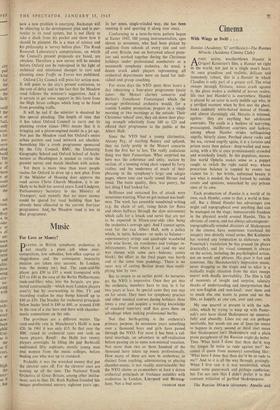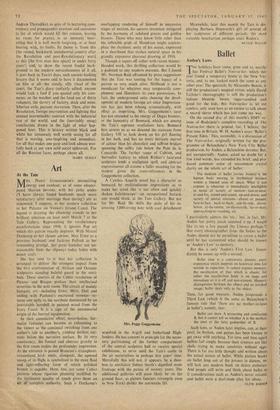Cinema
With Wings as Swift . . .
Hamlet. (Academy; 'U' certificate.)—The Russian Miracle. (Academy Cinema Club.) AFAST, active, weatherblown Hamlet is Grigori Kosintsev's film, a Hamlet set right in the world, not just in a single man's heart. At once grandiose and realistic, delicate and immensely robust, this is a Hamlet in which Claudius is only part of a greater evil. The wind sweeps through Elsinore, waves crash against it, the ghost makes a stableful of horses restive, life (not just Hamlet's) is everywhere; Hamlet is played by an actor in early middle age who, in a terrified moment when he first sees the ghost, looks suddenly white-haired instead of blonde, and almost alarmingly old. Horatio is wizened, ageless: they are anything but adolescent comrades. The castle is a beehive of scurrying, preoccupied, indifferent courtiers and lackeys, among whom Hamlet strides soliloquising angrily, bitterly alone. Perched above rocks and the sea, viewed angrily again, it is a fortress and prison more than palace: deep-walled and men- acing, with a life at once promiscuously crowded and wretchedly lonely. In this populous, mascu- line world Ophelia makes sense as a puppet taught to twitch the right social way, whose precarious balance is toppled by events too violent for it: her brittle, unformed beauty is, just what is needed, the face formed by outside events and opinions, unmarked by any private ones of its own.
Each production of Hamlet is a world of its own, each Hamlet, come to that, a world in him- self. But a filmed Hamlet has advantages you might call topographical over anything that can be managed on the stage; immeasurable freedom in the physical world around Hamlet. This is obvious, of course, and not always advantageous: topographically-minded directors of Shakespeare in the cinema have sometimes translated his imagery into directly visual terms. But Kosintsev has resisted any temptation to elaborate: with Pasternak's translation he has pruned (in places drastically), and his visual comment is always on the action, including the psychological action, not on words and phrases. His pace is fast and sonorous, like Shostakovich's impressive music, never dragging as the tragic end to what is a statically tragic situation from the start sweeps nearer with deadly inevitability. The film is full of moments of insight and surprise, salutary shocks of understanding and interpretation that are non-English and non-local: over them and so much else one wants to pause and see the film, as happily as one can, over and over.
My one quarrel at present is with the sub- titles, which by trying to keep up with Paster- nak's cuts have sliced Shakespeare up unmerci- fully and absurdly. Lines cut out are perhaps inevitable, but words cut out of lines (as seems to happen in every second or third one) mean that Shakespeare isn't Shakespeare and a plain prose paraphrase of the Russian might do better. Thus 'What have I done that thou dar'st wag thy tongue In noise so rude against me?' be- comes (I quote from memory) something like: 'What have I done that thou dar'st be so rude to me'?' And so it is all the way through, gratingly. When I first saw it it was unsubtitled, which meant some guess-work and perhaps confusion; but I'm not sure that I didn't prefer it to this constant irritation of garbled Shakespearese.
The Russian Miracle (directors: Annelie and
Andrew Thorndike), in spite of its hectoring com- mentary and propagandist evasions and omissions (a list of which would fill this column, leaving no room for praise), is so intensely inter- esting that it is well worth forgiving, or at least bearing with, its faults. Its theme is 'from this [the ruined, backward, unindustrial country after the Revolution and post-Revolutionary wars] to this [the first man into space] in under forty years'; and, to show the recent feudal back- ground to the modern miraculousness of it all, it goes back to Tsarist days, such ancient-looking history that it seems odd to have it documented on film at all—the stately, silly ritual of the court, the Tsar's diary (unfairly edited; anyone would look a fool if you quoted only his com- ments on the weather and the food out of thirty volumes), the slavery of factory, dock and mine, Siberian exile, peasant starvation. Then, after the Revolution, foreign intervention and lighting that seemed interminable; contrast with the industrial rest of the world, and the (inevitably smug) conclusions drawn in the light of what hap- pened later. This is history written black and white but immensely well worth seeing for all that is moving, awe-inspiring and immediate, for all that makes one gasp and look almost wist- fully back at our own mild social upheavals. For all the Russian faces, perhaps above all ISABEL QUIGLY































 Previous page
Previous page